IN FOCUS: How pet shops in Johor offer to smuggle animals into Singapore
It's illegal and puts the welfare of animals at risk, but some sellers in Johor Bahru say they're willing to smuggle pets into Singapore.
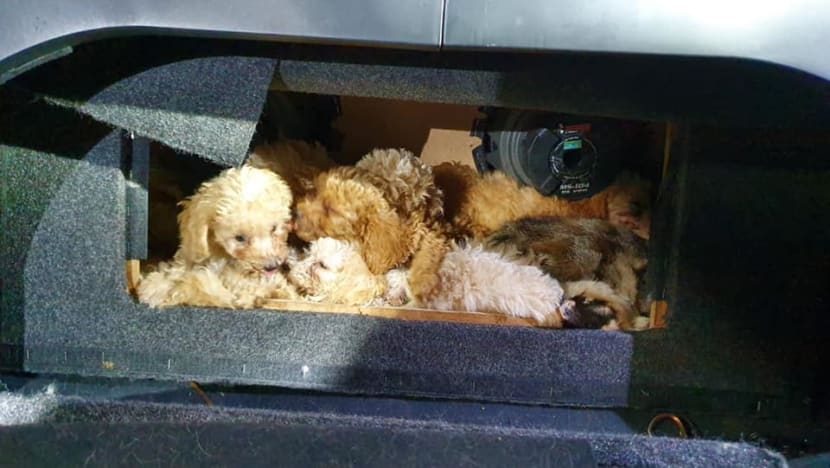
10 puppies and two cats hidden in a modified speaker box of a car in 2019. (Photo: ICA)
SINGAPORE: For any aspiring pet owner in Singapore put off by the cost of buying a new puppy or kitten, there is a potential money-saving solution.
Across the border in Johor Bahru (JB), pet shops offer animals at prices far below what they would cost in Singapore.
At one establishment that CNA visited, dozens of adorable puppies were on offer. The rows of poodles, pomeranians, corgis, chow chows and the rarer French bulldog and shiba inu were on sale at prices ranging from RM2,000 (S$620) for a pug to RM6,000 for a fluffy chow chow.
Dogs are not the only pets available for cheap across the Causeway. Cats and even exotic wildlife can be obtained.
But importing wildlife, such as snakes, hedgehogs and sugar gliders, into Singapore without a permit is a crime.
Similarly, dogs and cats brought into Singapore have to go through due import process, which may include quarantine, depending on the country they come from. From Malaysia, the process takes at least 30 days.
However, some pet stores in JB are apparently willing to work with customers to circumvent that process.
Last month, CNA visited five pet shops in JB, posing as a potential customer from Singapore. All of them said they could arrange for pets to be illicitly sent to Singapore if the buyer was unwilling to wait or pay to go through the proper immigration process.
Most explained that they engaged external parties for the illegal delivery, from picking up the pet to sneaking it across the border in vehicles and dropping it off at its new home in Singapore.
AGENTS "WILL TAKE ALL THE BLAME"
CNA was told by the shops that after the initial payment is made for the animal, pet shops could then arrange for a courier if customers did not want to go through the official import channels.
The cost, for which an upfront payment would be needed, is high.
Puppies and kittens as young as four weeks old typically cost a few hundred Singapore dollars in Malaysia. The pet shops quoted prices ranging from S$1,200 to S$2,300 per animal for an illicit delivery. They all quoted prices for delivery in Singapore dollars.
When asked why the delivery was so pricey, some shops said that the amount was pegged to the high level of risk for smugglers.
"It is a big risk because if they get caught, they will take all the blame. If he has to serve jail time, he will take all the responsibility," one pet shop employee said.
"There's no choice, the agents gamble with their lives. If you want to import it the proper way, it will cost a few thousand. There's the injections, the reports and quarantine. If you want we can arrange for this but it will be very expensive. Smuggling is definitely cheaper," he said.
Running through the process of obtaining a dog, the man said the buyer would have to place a deposit after the order for the animal is placed.
"When the dog reaches Malaysia, full payment must be given ... within three days before it enters Singapore, the courier fee must be paid in full. Then we will send it across."
In the event that the smuggler is caught at the border, the money paid will be irrecoverable, but the pet shop would send another dog for an additional delivery fee, he added.
If the smuggler is apprehended, they would have to produce documentation to prove to the store and the customer that it happened; if not, they are cheating you, he advised.
If the worker gets caught, it is not just the cost of the pet that he has to bear, the man said.
"If he has one dog, he will be fined S$10,000. If he has 10 dogs, I will have to pay a fine of S$100,000. And my worker will be banned from entering Singapore," he added, referring to the penalties for smuggling pets into Singapore.
Under Singapore's Animals and Birds Act, first-time offenders caught importing any animal or bird without a licence could be fined up to S$10,000, jailed up to 12 months, or both.
All pet shops approached said that the transportation fees go entirely to the smuggler, who are mostly external agents not employed by the store.
Another pet shop that had kittens and puppies on offer required upfront payment for both the animal and a flat S$1,500 courier fee. The store attendant added a disclaimer.
"This is a risk. Because we sell and you want to buy, so we find a person to send the pet over. But of course the courier does not want to be caught right? But if an accident happens then nothing can be done. It's an accident. There's no guarantee," the woman said.
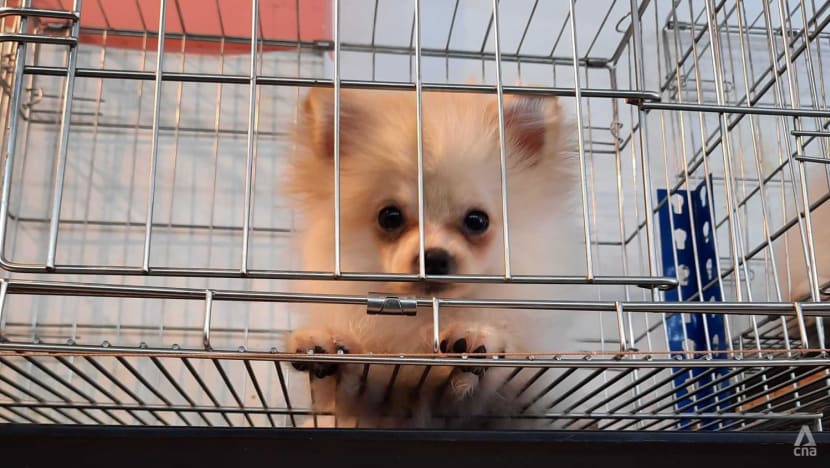
Prices of puppies and kittens at the pet shops ranged between RM1,800 and RM6,000.
Such prices are far below the cost of pets in Singapore, which can easily go up to five digits, even amid falling demand. CNA reported in December last year that prices of puppies and kittens that reached a high during the height of the pandemic in 2020 are beginning to fall as travel and working from the office resume.
Still, the price of a pet in Singapore will exceed its Malaysian counterpart. A toy poodle or pomeranian in Singapore could be upwards of S$3,000, while the equivalent in Malaysia could cost as little as S$550.
A British shorthair kitten in Malaysia sells for less than S$600, while the equivalent in Singapore is at least S$3,000, checks of four catteries showed.
SAFEGUARDING ANIMAL HEALTH
Singapore authorities told CNA that the import of all animals requires approval from the National Parks Board (NParks).
Besides having the required vaccinations, the animals must be certified healthy, have no signs of infectious diseases and be fit for travel, NParks and the Immigration and Checkpoints Authority (ICA) said in a joint statement.
Cats and dogs brought in from JB must undergo rabies vaccination and inspections, and be quarantined for at least 30 days. Malaysia is within the category of countries that Singapore considers to have an "undetermined risk" of rabies.
Rabies is a fatal viral disease that can be transmitted to humans through the bite of a rabid animal. Singapore has been free of rabies since 1953, according to NParks' website.
Pets may carry other contagious diseases, such as the canine distemper virus or feline parvoviral infection, which is easily spread to other pets.
Quarantine spaces at the Animal Quarantine Centre must be reserved in advance, and costs S$16.80 a day for a non-air-conditioned space for a dog or cat, and S$26.25 for an air-conditioned space.
Rabies vaccination costs S$65. Transporting the dog or cat from Tuas Checkpoint – the only land checkpoint that allows this – to the quarantine centre costs S$74.
In summary, importing a dog or cat from JB will cost at least S$643, and this does not include the costs of tests and certifications that owners have to obtain for animals prior to their import.
These measures are "in place to prevent the introduction of exotic animal diseases, such as rabies, which may pose a significant threat to Singapore’s public and animal health," NParks and ICA said.
With clear reasons for why pets being imported into Singapore must go through the official process, including protecting the health of the animal, why would prospective owners want to take the illicit option?
Ms Kieran Kua, head of operations at SOSD Singapore, a welfare group for dogs, said: "Purebred pups are in high demand since COVID started. The cost per pup can go up to almost five digits, so there's really quite a lot of profits to be made (by a person selling a dog, or a person smuggling the dog into Singapore).
"I've heard that there are even waitlists for purebred pups."
According to Ms Aarthi Sankar, executive director at the Society for the Prevention of Cruelty to Animals (SPCA), there is a possibility that people are not aware that they are purchasing an illegally smuggled pet.
60 SUSPECTED PET SMUGGLING CASES OVER 4 YEARS
Between 2018 and last year, NParks received about 60 "feedback cases" on the suspected illegal import of pets, including dogs, cats, rabbits and birds.
Dogs are the most common animals involved in such cases, authorities said. SPCA told CNA that it has encountered abandoned pedigree dogs that are not microchipped or licensed, making them likely to have been sourced through unlawful means such as smuggling.
NParks also deploys a K9 unit of detector dogs to sniff out wildlife and wildlife products.
Over the four-year period, there were more than 25 cases of wildlife being smuggled across land checkpoints. The smuggled animals ranged from tarantulas to geckos and star tortoises, NParks and ICA said.
Past cases involving animal smugglers have shed light on how these operations are carried out.
Animals can be hidden in vehicle compartments, such as under seats, in the spare tyre compartment or modified spaces such as the fuel tank and speaker box.
In 2018, a man was discovered attempting to smuggle four live kittens in his pants, while the man's mother had another kitten in her handbag. Six other kittens had been placed in a plastic canvas bag in the back of the car.
Birds have been found stuffed in potato chip tubes or paper packets, reptiles hidden in breakfast cereal boxes, sugar gliders in biscuit tins, hedgehogs in shoe boxes and geckos in zippered pouches, according to media reports.
A recent case prosecuted in the Singapore State Courts involved 13 dogs and two cats smuggled from JB across three occasions last year.
Desmond Lee Soon Kiat would take orders from Singapore customers and engage an accomplice to pick them up from Malaysia.
After receiving the animals, Lee would sell them for S$2,000 to S$2,800 each. Each animal cost about S$600 to S$900, according to court documents.
After accounting for the courier fee of S$200, Lee would earn a potential profit of about S$1,500 per animal.
On one of these occasions, Lee's accomplice hid 12 puppies in a makeshift bed behind the passenger seat while one kitten was placed in an external storage compartment on the driver's side of the lorry.
Other cases that make headlines reveal that the animals may pass through several agents before they reach their intended recipients.
A 2019 case involved six animals that were bundled into the spare tyre of a car. The three dogs and three cats were supposed to go through at least two different agents in Singapore, according to a past Yahoo News Singapore report.
Agents would note which lanes to take at checkpoints to avoid detailed vehicle checks.
In Lee's case, he was jailed for abetting by instigating his accomplice to smuggle the pets, showing that those who pay agents for such a purpose can also be prosecuted.
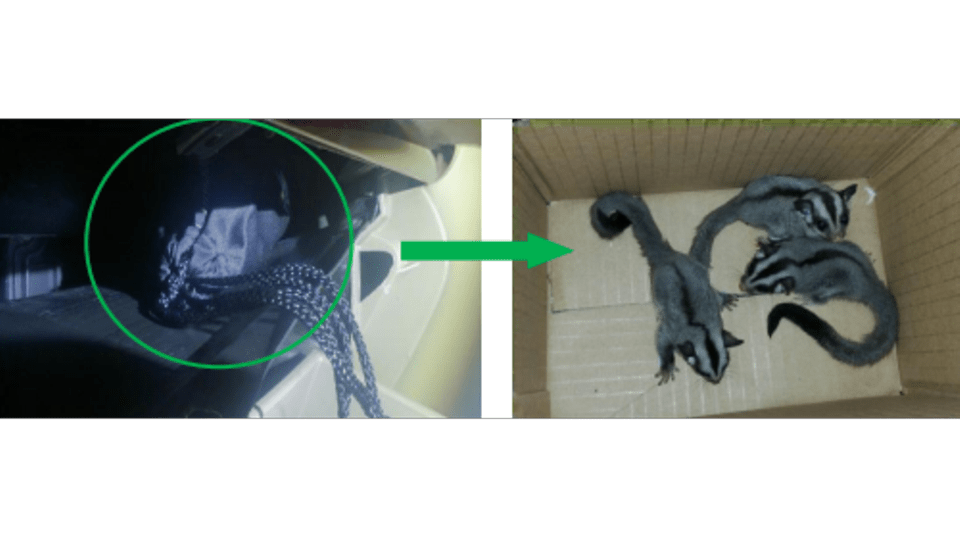
PETS SEDATED OR RESTRAINED FOR THE JOURNEY
One pet shop denied knowledge of how pets were smuggled through checkpoints. As the woman manning the store put it: "It is up to (the agent)."
Others said that sedatives would be administered to the pets according to their weight, and assured that the animals would not suffer any side effects. Sedating them would ensure that they stay quiet and under the radar when drivers pass through security checks.
Two said that the dogs and cats would just be waking up as they reach their new owners. One claimed that sedatives were professionally administered by a veterinarian and instructed the buyer to give groggy pets plenty of water.
Another did not sedate its dogs, but muzzled them to prevent them from making noise.
But what if pets suffer side effects from the sedatives or other illnesses?
"I can guarantee when I sell them, they have no problems. I can only say that. If accidents happen, we don't dare to say," the woman said.
"Let's say you want this one, you can check the condition now. If it's a minor problem like a flu, then you can visit the vet. If it's serious, like there's a problem with its leg, you can tell from here. So when it's sent over, nothing can be done about it, that kind is an accident."
Another man guaranteed that the dogs were healthy as they wanted to avoid any "trouble".
"Because we want to do long-term business. If we don't do it well there will be a lot of trouble, then it will be bad for business and for you. So we will ensure the dogs are okay before we send them out."
Similarly, another pet store claimed they would not send a sick pet.
However, animal welfare groups noted that smuggling an animal puts it at risk.
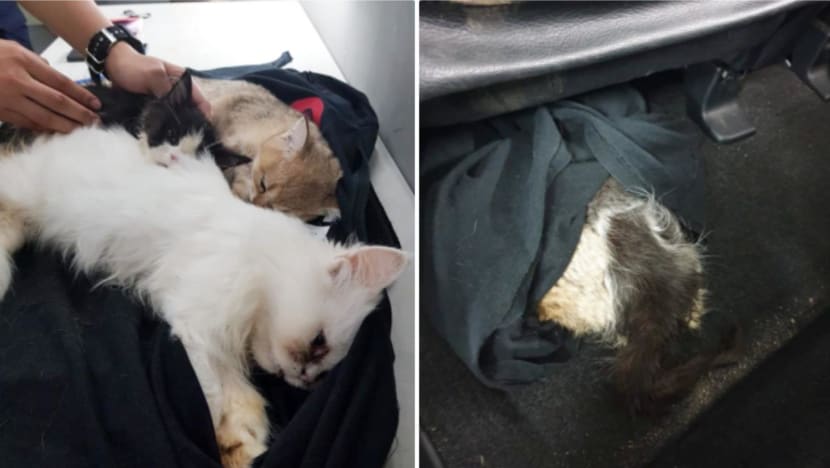
Cat Welfare Society senior community engagement manager Li Jiehui said: "The conditions under which cats are smuggled are often inhumane and cruel. They are often packed into tight spaces, without access to food, water or proper ventilation.
"This can cause serious health issues for the cats as well as unnecessary stress and trauma. Further, due to poor conditions and lack of medical care, the cats can continue to have underlying health conditions that can result in death."
SOSD's Ms Kua noted that the manner in which dogs are smuggled can cause behavioural problems.
"For example, they can become fearful of being confined in small spaces. Or they can become nervous being in close proximity with other dogs, or protective or defensive about their own space," she added.
In past court cases, prosecutors have said that smuggled pets are subjected to poorly ventilated and cramped spaces, resulting in fluctuating body temperatures and dehydration.
In Lee's case, two dogs died under such circumstances. Sedation also takes away the animals' ability to increase their breathing rate to compensate for the lack of ventilation.
Animals are also at risk of choking on their saliva, according to media reports that quoted an NParks' prosecutor in the case of a man jailed for attempting to smuggle six puppies and a bird under a car seat. Four puppies and a bird died after they were rescued.
Animals from unknown sources present another problem: Genetic and health issues from poor breeding practices.
SPCA's Ms Aarthi said: "Many of them may be from puppy mills where they may have been subject to terrible living conditions and inhumane breeding methods, with little attention paid to their health and care.
"In many instances, these dogs may suffer from genetic conditions caused by in-breeding or have severe skin problems and health issues."
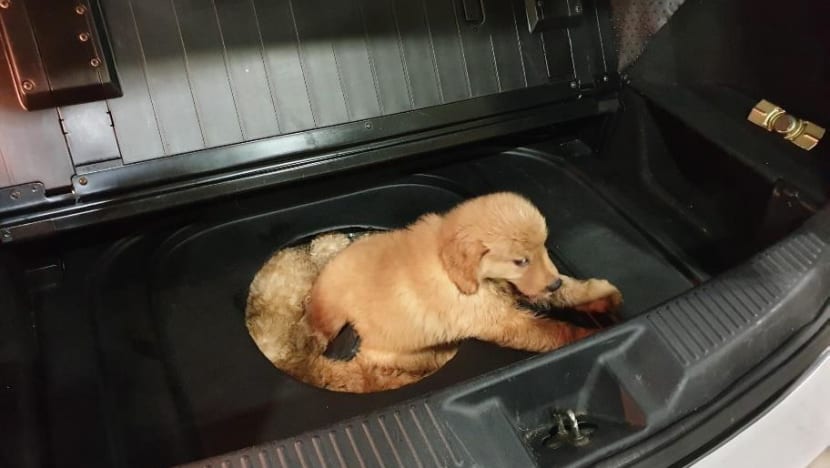
REHOMING AND REPATRIATION
NParks and ICA said surviving pet animals would be rehomed if found suitable. SPCA said it helps the authorities with rehoming efforts from time to time.
Last year, the SPCA rehomed more than 30 pedigree dogs confiscated from smugglers. All were put up for adoption and have since been adopted, according to Ms Aarthi.
On wildlife, the authorities said that the Center for Wildlife Rehabilitation (CWR) would care for them while investigations are pending.
"When the case is concluded, CWR follows the relevant guidelines by the Convention on International Trade in Endangered Species of Wild Flora and Fauna (CITES) on the treatment of illegally traded specimens.
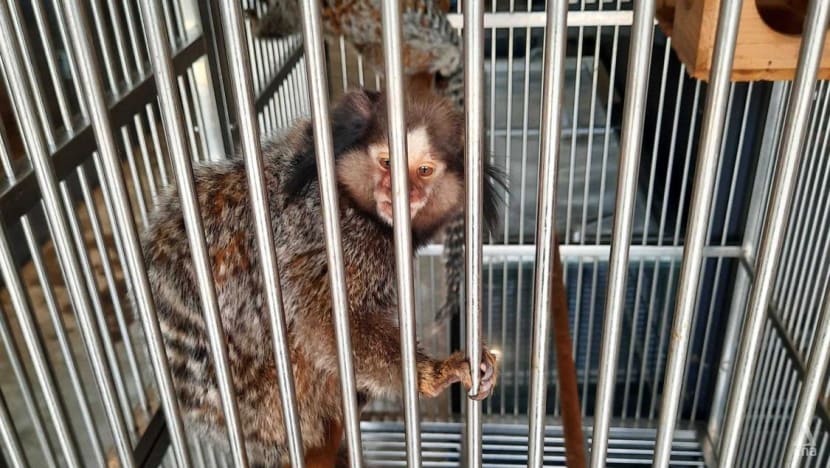
"Repatriation of these wildlife back into their country of origin is sought. If repatriation is not possible, other possible options include reaching out to relevant organisations such as Mandai Wildlife Group and ACRES to care for these animals."
While the two exotic pet shops that CNA visited in JB did not provide smuggling services, the sale of such wildlife was rife in a few Telegram groups CNA saw.
An offender who imports any living wildlife without approval under the Wildlife Act can be fined up to S$10,000 or jailed up to 12 months, or both. The penalties for the illegal import of endangered wildlife differs depending on the species.
The authorities cited four main reasons why Singapore banned the act of keeping exotic animals as pets, one reason being the owner's potential lack of knowledge on how to properly care for such animals.
Wildlife can also harbour diseases that can be transmitted to humans and other domestic pets, the authorities added.
Furthermore, the collection of wild animals for trade will lead to ecosystem imbalance and threaten the survival of endangered species.
If released in the wild, exotic pets may harm Singapore’s native biodiversity, the authorities said.
The law was still a key deterrent in the case of a 29-year-old marketing executive, who longed to own a sugar glider after seeing the diminutive tree-dwelling mammal on a friend's Instagram story.
Speaking to CNA, the man, who wanted to be known as John, said that he would accompany a friend to JB to fill up petrol between 2016 and 2017.
"So one fine petrol-pumping night, I decided that I wanted to get (a sugar glider for) myself. We went to Pasar Karat in JB – it’s a night market. There were stalls that sold loads of exotic animals. I saw the sugar gliders but somehow shifted my attention to the hedgehogs instead."
Recalling that the spiny mammal was priced at RM180 each, John added that he considered hiding it in his jacket pocket or under the front seats of the car.
"But my friends who were there told me not to as they didn’t want to risk us getting caught at customs as we knew it was prohibited.
"They managed to talk some sense into me so I didn't in the end."
Read this story in Bahasa Melayu here.


















